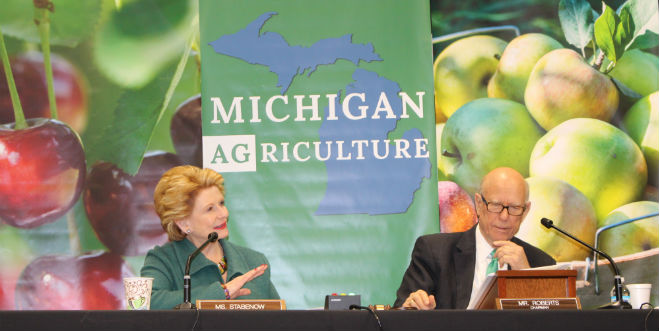

Oct 17, 2017Organic growers tally wish lists for new farm bill
Organic growers say they’re more than a niche of the agriculture market, and the group appears to be getting Washington’s attention as they lobby for more input on the 2018 Farm Bill.
Ironically, some of the attention from the Capitol seems to come on the heels of outrage over an apparent failure of the USDA’s National Organic Program. The Washington Post reported in May that three large shipments of non-organic corn and soybeans were imported to the United States as organic, and in at least one case, sold as such.
The growers’ frustration was later echoed in official comments made later by leaders of the U.S. Senate Committee on Agriculture. Months later, the growers are speaking up, and even drawing up detailed wish lists for the 2018 Farm Bill.
Three Democratic senators, Dianne Feinstein of California, Debbie Stabenow of Michigan, and Patrick Leahy of Virginia on June 26 called on Department of Agriculture Secretary Sonny Perdue to increase enforcement of the organic program’s rules.
“Organic farmers in the United States cannot be expected to compete against fraudulent organic imports, and American consumers have the right to expect that products sold as organic meet the criteria for use of the organic label as required by law,” the senators wrote. “Such fraud undermines the National Organic Program’s continued success and hurts American farmers who have worked hard to adopt organic practices.”
Senator Stabenow, pictured above, conducted a Farm Bill field hearing in May in Frankenmuth, Michigan. Roberts is chairman of the Senate Committee on Agriculture, Nutrition and Foresty, while Stabenow is the committee’s ranking member.
The U.S. Senate Committee on Agriculture, Nutrition, and Forestry, on July 13, held a hearing, titled “Opportunities in Global and Local Markets, Specialty Crops and Organics: Perspectives for the 2018 Farm Bill.”
In his opening statement at the meeting, Chairman Pat Roberts, R-Kansas, said that it appeared “uncertainty and dysfunction have overtaken the National Organic Standards Board (NOSB) and the regulations associated with the National Organic Program.
“These problems create an unreliable regulatory environment and prevent farmers that choose organics from utilizing advancements in technology and operating their businesses in an efficient and effective manner,” he said. “Simply put, this hurts producers and economies in rural America.”
But the outrage over fake organic imports can become a vehicle for talking about other issues affecting the organics program.
Among those who testified at the July 13 hearing was Theo Crisantes, a third-generation grower and vice president of operations at Wholesum Harvest. A family farm, Wholesum Harvest currently grows tomatoes, cucumbers, eggplant, peppers and squash on 600 acres in Arizona and Mexico and claims an annual revenue of $55 million a year.
Crisantes’ hot button issues were proposals considered by the NOSB that would eliminate hydroponics and container growing methods from organic certification.
“These growing methods, which have been certified by USDA since the inception of the organic program, are crucial to meeting the rising consumer demand for organic produce,” he said. “For me personally containers and greenhouses are necessary to improve the ecology of our farmland.” Crisantes said he’s a board member of a trade group, the Coalition for Sustainable Organics, that advocates for the same position.
Crisantes argued for more operators serving on the NOSB, saying that the organic sector is “no longer a niche industry” and “it is nearly impossible to capture and reflect the variety of operations that make up the organic industry with a 15-member board.”
The U.S. had 12,818 certified organic farms in 2015 that produced and sold $6.2 billion in organic commodities, according to the USDA and the National Agricultural Statistics Service.
Other groups are putting their priorities for the farm bill in writing.
The Organic Trade Association (OTA), which represents 9,500 organic businesses in America, recently drafted a formal document concerning its priorities for the 2018 Farm Bill. The four-page document organizes new asks and bills already introduced to Congress around three “pillars” of healthy markets, successful organic farmers and expanding the production base.
Among the specific goals: Ensure effective oversight, robust investigations and enforcement across the entire supply chain, and provide one-time mandatory funding of $5 million for technology upgrades for tracking international trade. Other priorities for the association are $50 million a year for the Organic Agriculture Research and Extension Initiative and more flexibility in the National Organic Certification Cost Share program.
OTA board member Melody Meyer said all of the wishes ride on the 2018 Farm Bill actually being approved. The last farm bill was only approved in 2014 after a two-year gap during which there was no official farm bill and provisions for many USDA programs simply lapsed.
“I don’t have a crystal ball, but we hope there will be a farm bill,” she said. “It’s up to Congress to do their job and make it happen.”
— Stephen Kloosterman, assistant editor















